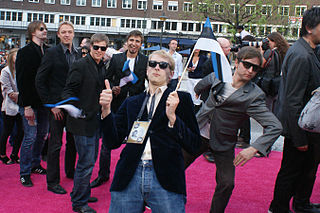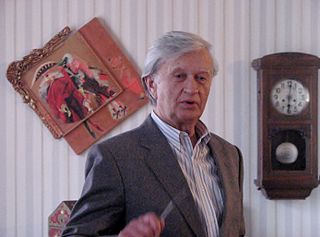
Tartu is the second largest city in Estonia after Tallinn. Tartu has a population of 97,435. It is 186 kilometres southeast of Tallinn and 245 kilometres northeast of Riga, Latvia. Tartu lies on the Emajõgi river, which connects the two largest lakes in Estonia, Lake Võrtsjärv and Lake Peipus. From the 13th century until the end of the 19th century, Tartu was known in most of the world by variants of its historical name Dorpat.

The anthem of the Estonian SSR was the Soviet regional anthem of the Estonian SSR between 1945 and 1990 when Estonia was occupied by the Soviet Union.

The national flag of Estonia is a tricolour featuring three equal horizontal bands of blue (top), black (middle), and white (bottom). The flag is called sinimustvalge in Estonian.
The recorded history of music in Estonia dates as far back as the 12th century.

The Estonia men's national football team represents Estonia in international football matches and is controlled by the Estonian Football Association, the governing body for football in Estonia. Estonia's home ground is Lilleküla Stadium in the capital city Tallinn.

Konstantin Päts was an Estonian statesman and the country's president from 1938 to 1940. Päts was one of the most influential politicians of the independent democratic Republic of Estonia, and during the two decades prior to World War II he also served five times as the country's State Elder. He carried out a self-coup on 12 March 1934. After the 16–17 June 1940 Soviet invasion and occupation of Estonia, Päts remained formally in office for over a month, until he was forced to resign, imprisoned by the new Stalinist regime, and deported to the USSR, where he died in 1956.

The Estonian Workers' Commune was a government claiming the Bolshevik-occupied parts of Republic of Estonia as its territories during the Estonian War of Independence and the Russian Civil War. It was recognised as an independent state only by Russian SFSR on December 7th, 1918.

Cinema of Estonia is the film industry of the Republic of Estonia. The motion pictures have won international awards and each year new Estonian films are seen at film festivals around the globe.

Artur Kapp was an Estonian composer.

The Holocaust in Estonia refers to Nazi crimes during the occupation of Estonia by Nazi Germany.
Tallinnfilm is the oldest surviving film studio in Estonia. It was founded as Estonian Culture Film in 1931, and was nationalized in 1940 after Estonia was integrated into the Soviet Union. During the first year of Soviet Occupation (1940–1941) Eesti Kultuurfilm was taken over by the Communist Party and renamed Kinokroonika Eesti Stuudio. In 1942 during the German occupation the studio was renamed Kinokroonika Tallinna Stuudio and then renamed again as Tallinna Kinostuudio in 1947 by the Soviets. The Tallinn Film Studio was renamed Kunstiliste ja Kroonikafilmide Tallinna Kinostuudio in 1954 and in 1963 was renamed again Tallinnfilm.

Tiit Sokk is a retired Estonian professional basketball player and current coach. Often cited as one of the very best European point guards of his generation, he is widely recognized as the greatest Estonian basketball player in history. Elected to the Hall of fame of Estonian basketball in 2010.
The Estonian Writers' Union (Estonian: Eesti Kirjanike Liit, abbr. EWU is a professional association of Estonian writers and literary critics.

Malcolm Lincoln was an Estonian band that formed in October 2009. The members are Robin Juhkental, Jakob Juhkam, Siim Raidma, Ott Adamson, Johan Alexander Petti and Hans Kurvits. The original lineup consisted of Robin Juhkental (vocals/electronics) and Madis Kubu (bass). Juhkental has described their style as "electronic pop with a slightly quirky undertone". The band's name originates from the game show Who Wants to Be a Millionaire?, where a woman incorrectly answered "Malcolm Lincoln" to a question involving the first name of Abraham Lincoln, the 16th President of the United States. Malcolm Lincoln, together with a group of backing vocalists called Manpower 4, won the competition Eesti Laul 2010 with the song "Siren" and represented Estonia in the Eurovision Song Contest 2010. The band released their debut album Loaded With Zoul in May 2010.

Estonia, officially the Republic of Estonia, is a country by the Baltic Sea in Northern Europe. It is bordered to the north by the Gulf of Finland across from Finland, to the west by the sea across from Sweden, to the south by Latvia, and to the east by Lake Peipus and Russia. The territory of Estonia consists of the mainland, the larger islands of Saaremaa and Hiiumaa, and over 2,300 other islands and islets on the east coast of the Baltic Sea, covering a total area of 45,335 square kilometres (17,504 sq mi). Tallinn, the capital city, and Tartu are the two largest urban areas. The Estonian language is the indigenous and official language. It is the first language of the majority of the population of 1.4 million.

Tõnis Mägi is an Estonian singer, guitarist, composer and actor. He is one of the most influential and remarkable names in Estonian rock music of the past 40 years. More recently, he is known for his political activity in support of the right-wing populist and national-conservative Conservative People's Party of Estonia as well as vaccine hesitancy.

Ewert and The Two Dragons is an Estonian indie-rock band. The line-up consists of vocalist Ewert Sundja, guitarist Erki Pärnoja, drummer Kristjan Kallas, and bassist Ivo Etti. Their debut album The Hills Behind The Hills was released in 2009. The follow-up Good Man Down was recorded at the beginning of 2011 and was released in April on I Love You Records. The group's third album, Circles, was released in 2015 on Sire Records. They have gained recognition in the Baltic states as well as in several other European countries.
Estonian punk is a punk movement in Estonia, part of the international punk subculture.

Jüri Lina is an Estonian journalist, writer, paranormal investigator, music producer, radio host, film director and ufologist.

Hans Kaldoja was an Estonian stage, television, film, and radio voice actor whose career began in the mid-1960s. Kaldoja was employed at the Estonian Drama Theatre for twenty-seven years; from 1965 until 1992, appearing in over one hundred theatre roles, before becoming a freelance actor. He has also recorded nearly two hundred audiobooks for the Estonian Library for the Blind.















